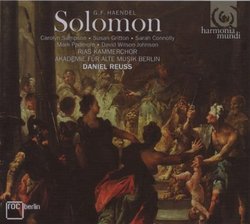| All Artists: George Frideric Handel, Daniel Reuss, Akademie fur Alte Musik Berlin, RIAS Kammerchor, Carolyn Sampson, Susan Gritton, Sarah Connolly, Mark Padmore, David Wilson-Johnson Title: Solomon Members Wishing: 0 Total Copies: 0 Label: Harmonia Mundi (France) Original Release Date: 1/1/2007 Re-Release Date: 11/13/2007 Album Type: Import Genre: Classical Styles: Opera & Classical Vocal, Chamber Music, Historical Periods, Baroque (c.1600-1750), Classical (c.1770-1830) Number of Discs: 2 SwapaCD Credits: 2 UPC: 794881848423 |
Search - George Frideric Handel, Daniel Reuss, Akademie fur Alte Musik Berlin :: Solomon
 | George Frideric Handel, Daniel Reuss, Akademie fur Alte Musik Berlin Solomon Genre: Classical
|
Larger Image |
CD Details |
CD ReviewsThe Best-Cast "Solomon" Available Nicholas A. Deutsch | New York, NY USA | 12/14/2009 (5 out of 5 stars) "Briefly: to my ears, this is simply the best-cast SOLOMON in the catalogue, and if it were not for the cuts (presumably made to avoid a third CD) it would be my first recommendation. As it is, it ranks with the classic Gardiner set - also slightly trimmed and re-arranged at the end of Part Three. Like Gardiner (and Handel!) Reuss casts the title role with a female alto, to my mind preferable to even a first-rate countertenor: Sarah Connolly is very fine, just edging out Gardiner's excellent Carolyn Watkinson. (Could someone please now have her record the other great Caterina Galli male role, Joacim in SUSANNA?) The division of the four soprano roles between two singers is neatly done, and what singers they are: Susan Gritton and Carolyn Sampson in top form. (Handel, by the way, originally gave all three main soprano roles to one singer, with a secondary artist for the episodic role of the 2nd Woman.) Nor can I imagine better current exponents of the tenor and bass roles than Mark Padmore and David Wilson-Johnson. Conductor Daniel Reuss I know mainly from his recordings of the music of Frank Martin: superb versions of the Mass and Five Ariel Songs, a lovely-to-listen-to but underdramatized LE VIN HERBE. This recording comes down squarely on the positive side. While I value Paul McCreesh's note-complete SOLOMON (with countertenor Andreas Scholl in the title role), I enjoy this and the Gardiner every bit as much. Recommended." A first-class performance of another great Handel oratorio Baroque and opera freak | Hong Kong | 04/04/2009 (5 out of 5 stars) "I must say that I disagree with the previous Amazon reviewer's opinion of this recording. I have not compared any of the other recordings of this very fine oratorio, either the recent recordings conducted by Budday and McGegan or the "classic" recordings by Gardiner and McCreesh, all of which have received strong reviews, but I can say that, as Richard Wigmore (Gramophone, December 2007) concluded not long after McGegan's and Reuss's recordings came out, this is a very fine recording that stands with the best, and which, in Wigmore's judgement, in some ways surpasses the others. The prominence of Sarah Connolly, Susan Gritton, Carolyn Sampson, and Mark Padmore in the Handel (and other Baroque) repertory need hardly be pointed out, and in this recording none of them falls short of her or his usual high standards. Conductor Daniel Reuss may not yet have the Handelian credentials of the likes of Rene Jacobs, who shook the Baroque music world in 2005 with his incredible recording of Saul, but Harmonia Mundi would not have taken Reuss and the Akademie fur Alte Musik Berlin on board to produce their follow-up to Saul if they were not very sure they could achieve equally high standards. If Reuss has gone off to Estonia, it may be because Estonia is a country with one of the finest choral traditions in the world. This was certainly confirmed for me at the recent performance by the Estonian Philharmonic Chamber Choir during the 2009 Hong Kong Arts Festival. I do not recall ever hearing a better choral performance by a relatively small professional choir in my life. Regardng the EPCC, a reviewer for The New York Times stated, "The performances were so fine that they left you feeling like an ingrate, greedily hungry for more." I had exactly the same feeling. Arvo Pärt, one of the greatest of contemporary composers, is also Estonian, so the country is certainly no "backwoods" in the world of music. We can only look forward greatly to future recordings conducted by Daniel Reuss, and this recording gives ample reason for such eager anticipation. And the oratorio itself, premiered in 1749, ten years after Saul, is surely one of Handel's most spectacular oratorios, based on an amazing set of great Biblical stories revolving around King Solomon. And the quality of the English poetry in the libretto is -- as is usual for Handel's oratorios -- second to none, even if the identity of the poet is unknown. Here, for example, is one of the Queen's of Sheba's recitatives:
The harmony's divine, great king,/All, all obey the artist's string./And now, illustrious prince, receive/Such tribute as my realm can give./Here, purest gold, from earth's dark entrails torn;/And gems resplendent, that outshine the morn;/There balsam breathes a grateful smell,/With thee the fragrant strangers wish to dwell./Yet of ev'ry object I behold,/Amid the glare of gems and gold,/The temple most attracts my eye,/Where with unwearied zeal, you serve the Lord on high." |

 Track Listings (27) - Disc #1
Track Listings (27) - Disc #1